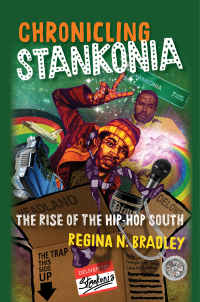Buy Chronicling Stankonia: The Rise of the Hip-Hop South PDF ebook by author Regina Bradley – published by The University of North Carolina Press in 2021 and save up to 80% compared to the print version of this textbook. With PDF version of this textbook, not only save you money, you can also highlight, add text, underline add post-it notes, bookmarks to pages, instantly search for the major terms or chapter titles, etc.
You can search our site for other versions of the Chronicling Stankonia: The Rise of the Hip-Hop South PDF ebook. You can also search for others PDF ebooks from publisher The University of North Carolina Press, as well as from your favorite authors. We have thousands of online textbooks and course materials (mostly in PDF) that you can download immediately after purchase.
Note: e-textBooks do not come with access codes, CDs/DVDs, workbooks, and other supplemental items.
eBook Details:
Full title: Chronicling Stankonia: The Rise of the Hip-Hop South
Edition:
Copyright year: 2021
Publisher: The University of North Carolina Press
Author: Regina Bradley
ISBN: 9781469661964, 9781469661971
Format: PDF
Description of Chronicling Stankonia: The Rise of the Hip-Hop South:
“Chronicling Stankonia situates hip hop as an intervention in constructing post-Civil Rights black identities and cultural discourse. For southern blacks, the past is often restricted to three recognizable historical moments – the Antebellum Era, Jim Crow, and the Civil Rights Movement. Aside from the deeply traumatic experience of these periods of history, they also serve as cornerstones of validating and recognizing southern blacks’ experiences. However, the challenge for post-Civil Rights generations of southern blacks is speaking truth to power when their truths depart the trajectory of what was considered power in the past. Chronicling Stankonia updates the black South using hip hop as an agent to reflect multiple intersections of time, race, and southernness in the late twentieth and early twenty-first centuries. Part of southern hip hop culture’s truth remains attached to the past but its power is grounded in the fact that younger southerners use hip hop to embrace the possibility of multiple Souths, multiple narratives, and multiple entry points into contemporary southern black identities”–





